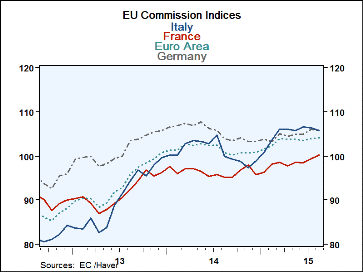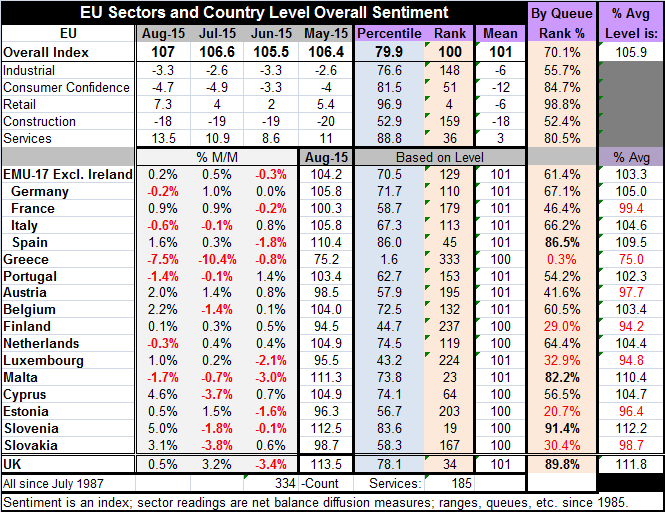 Global| Aug 28 2015
Global| Aug 28 2015EU/EMU Indices Rise in August-Ho Hum
Summary
The EU index continues to run stronger than the EMU index in the EU Commission index framework. The overall EU index stands in the 70.1 percentile of its historic queue while the EMU index stands in the 61.4 percentile of its queue. [...]
 The EU index continues to run stronger than the EMU index in the EU Commission index framework. The overall EU index stands in the 70.1 percentile of its historic queue while the EMU index stands in the 61.4 percentile of its queue. The countries that are EU members but not EMU members are doing better according to this gauge. This, of course, has a lot to do with the EMU countries that have been strapped to austerity programs.
The EU index continues to run stronger than the EMU index in the EU Commission index framework. The overall EU index stands in the 70.1 percentile of its historic queue while the EMU index stands in the 61.4 percentile of its queue. The countries that are EU members but not EMU members are doing better according to this gauge. This, of course, has a lot to do with the EMU countries that have been strapped to austerity programs.
The EU sectors and headline show that the overall gauge rose to 107 in August from 106.6 in July. The move up was boosted by consumer confidence that became less of a negative, by retailing that moved up smartly by 3.3 points on the month, by construction that moved up by one point, and by services that improved by 2.6 points on the month. Holding the gain back was the industrial sector where the index slipped on the month by 0.7 points.
The queue standings show that the sectors that are strongest relative to their respective historic values are retailing, which has been stronger only 1.2% of the time, consumer confidence, which has been stronger 15.3% of the time and the services sector which has been stronger 19.5% of the time. Consumer confidence is in good shape, but the retail sector is all but overflowing- rarely higher. However, construction stands only in its 52nd percentile and the industrial sector is only in its 55.7 percentile. Both of these sectors are being left behind with barely better than median-level readings.
Only 6 of 16 reporting EMU countries showed declines in their indices this month. But Greece remains in terrible straits, having fallen 7.5% in August after falling 10.4% in July. The Greek index has been weaker than its current value only 0.3% of the time. However, there are five countries at or near the bottom 30% of their historic queues. And on the upside only three members are in the top 20% of their respective queues of data; the same three are the only members in the top 70%. The EMU index stands in the 61.4 percentile of its queue, but an unweighted average of the member countries in the table only reaches 51.9%. Small economies are doing much worse than the larger ones. Fully 7 of 16 reporters are below their historic midpoints for the overall EU indices.
So while the EU and EMU indices have risen this month, the levels attained by the indices are still weak and the upward momentum is weak as well. The rise in the EU indices this month may have been a surprise, but it is not much of one. There is still little here in the way of good news or of trends that will carry beyond this month.

Robert Brusca
AuthorMore in Author Profile »Robert A. Brusca is Chief Economist of Fact and Opinion Economics, a consulting firm he founded in Manhattan. He has been an economist on Wall Street for over 25 years. He has visited central banking and large institutional clients in over 30 countries in his career as an economist. Mr. Brusca was a Divisional Research Chief at the Federal Reserve Bank of NY (Chief of the International Financial markets Division), a Fed Watcher at Irving Trust and Chief Economist at Nikko Securities International. He is widely quoted and appears in various media. Mr. Brusca holds an MA and Ph.D. in economics from Michigan State University and a BA in Economics from the University of Michigan. His research pursues his strong interests in non aligned policy economics as well as international economics. FAO Economics’ research targets investors to assist them in making better investment decisions in stocks, bonds and in a variety of international assets. The company does not manage money and has no conflicts in giving economic advice.
More Economy in Brief
 Global| Feb 05 2026
Global| Feb 05 2026Charts of the Week: Balanced Policy, Resilient Data and AI Narratives
by:Andrew Cates






